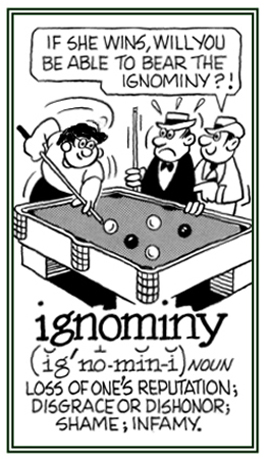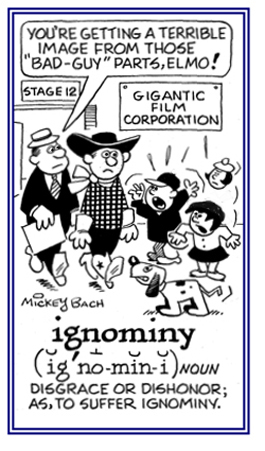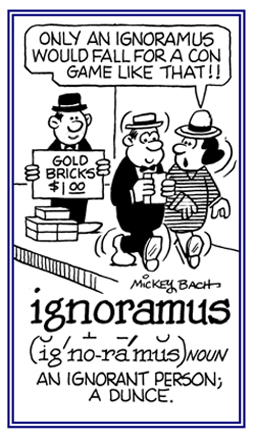gno-, gnos-, gnoto-, -gnostic, -gnosia, -gnomic, -gnomonic, -gnomical, -gnomy, -gnosia, -gnostic, -gnosis
(Greek: know, learn, discern)
1. A great personal dishonor or humiliation: Imagine the ignominy of going into the classroom in the morning without having pants on!
2. A shameful or disgraceful action, conduct, or character: After causing the accident, running away, and being caught afterwards, Ted suffered the ignominy of having to go to the police station in the police car and having to pay a huge fine.
3. Etymology: from Latin ignominia; from French ignominie; literally, "without a name".

© ALL rights are reserved.

© ALL rights are reserved.
Go to this Word A Day Revisited Index
so you can see more of Mickey Bach's cartoons.
2. A shameful or disgraceful action, conduct, or character: After causing the accident, running away, and being caught afterwards, Ted suffered the ignominy of having to go to the police station in the police car and having to pay a huge fine.
3. Etymology: from Latin ignominia; from French ignominie; literally, "without a name".


Go to this Word A Day Revisited Index
so you can see more of Mickey Bach's cartoons.
so you can see more of Mickey Bach's cartoons.
1. Someone who has an extreme lack of knowledge: To label or to indicate that someone is an ignoramus, is saying that he or she is stupid or uneducated; however, it can also mean that a person just doesn’t know the real facts about certain things.
2. Etymology: from Latin ignorare, "not to know, to misunderstand, to disregard"; from ignarus, "not knowing, unaware"; i- (variant of in-, "not" + gnarus, "aware, acquainted with".

© ALL rights are reserved.
Go to this Word A Day Revisited Index
2. Etymology: from Latin ignorare, "not to know, to misunderstand, to disregard"; from ignarus, "not knowing, unaware"; i- (variant of in-, "not" + gnarus, "aware, acquainted with".

Go to this Word A Day Revisited Index
so you can see more of Mickey Bach's cartoons.
1. A lack of knowledge, education, learning, information, etc.
2. Unawareness of something, often of something important; uninformed.
2. Unawareness of something, often of something important; uninformed.
There is one thing to be said about ignorance—it sure causes a lot of interesting arguments.
ignorant
1. Lacking in knowledge or training; unlearned: an ignorant man.
2. Lacking knowledge or information as to a particular subject or fact: "He is ignorant of quantum physics, as most of us are.
3. Uninformed; unaware.
4. A result of or showing a lack of knowledge or training: "He made such an ignorant statement that no one had any confidence in anything that he said."
2. Lacking knowledge or information as to a particular subject or fact: "He is ignorant of quantum physics, as most of us are.
3. Uninformed; unaware.
4. A result of or showing a lack of knowledge or training: "He made such an ignorant statement that no one had any confidence in anything that he said."
Ignorantia legis neminem excusat.
Ignorance of the law excuses no one.
Also given as Ignorantia iuris (juris) non excusat, "Ignorance of the law does not excuse". An even broader expression is Ignorantia non excusat, "Ignorance does not excuse"; which goes beyond the realm of law, providing us with the criticism of some unfortunate one who says, "But I didn't know . . . ."
ignorantly
1. Without knowledge, instruction, or information.
2. Unskillfully; inexpertly: "A man may mistake blunders as being wonderful and ignorantly admire them."
2. Unskillfully; inexpertly: "A man may mistake blunders as being wonderful and ignorantly admire them."
ignore (verb), ignores; ignored; ignoring
To refuse to pay attention to; to disregard; refusal to recognize.
ignote
Anyone who is unknown.
immunodiagnosis
1. Diagnosis of disease based on antigen-antibody reactions in the blood serum.
2. The diagnosis of disease by studying the antibodies in a sample of blood serum.
2. The diagnosis of disease by studying the antibodies in a sample of blood serum.
logagnosia
1. Any speech defect due to damage of the central nervous system.
2. Partial or total loss of the ability to articulate ideas or comprehend a spoken or written language, resulting from damage to the brain caused by injury or disease.
3. A defect or loss of the ability to speak or write, the loss of the ability to understand spoken or written language, due to injury or disease of the brain centers.
2. Partial or total loss of the ability to articulate ideas or comprehend a spoken or written language, resulting from damage to the brain caused by injury or disease.
3. A defect or loss of the ability to speak or write, the loss of the ability to understand spoken or written language, due to injury or disease of the brain centers.
misdiagnose (verb), misdiagnoses; misdiagnosed; misdiagnosing
1. To make an incorrect diagnosis.
2. To diagnose erroneously.
2. To diagnose erroneously.
1. A wrong, incorrect, or mistaken identification of an illness: "Harm may result when a patient gets a misdiagnosis because he or she may get an incorrect therapeutic treatment."
2. A conclusion, identification, or decision reached by mistake: "Unless there is proper testing, the potential for a misdiagnosis can be considerable."
2. A conclusion, identification, or decision reached by mistake: "Unless there is proper testing, the potential for a misdiagnosis can be considerable."
"After several misdiagnoses, the committee found out what the problem actually was and then tehy were able to come up with a successful solution."
nonprognosticative
Not offering prognostications.
omni-ignorant
1. Completely lacking knowledge about a subject, several topics, or branches of learning.
2. The condition of being totally uneducated, unaware, or uninformed about something in particular, or about a multitude of things.
2. The condition of being totally uneducated, unaware, or uninformed about something in particular, or about a multitude of things.
overdiagnosis
Inter-related cross references, directly or indirectly, involving word units meaning "know, knowledge; learn, learning": cogni-; discip-; histor-; intellect-; learn, know; math-; sap-; sci-; sopho-.


